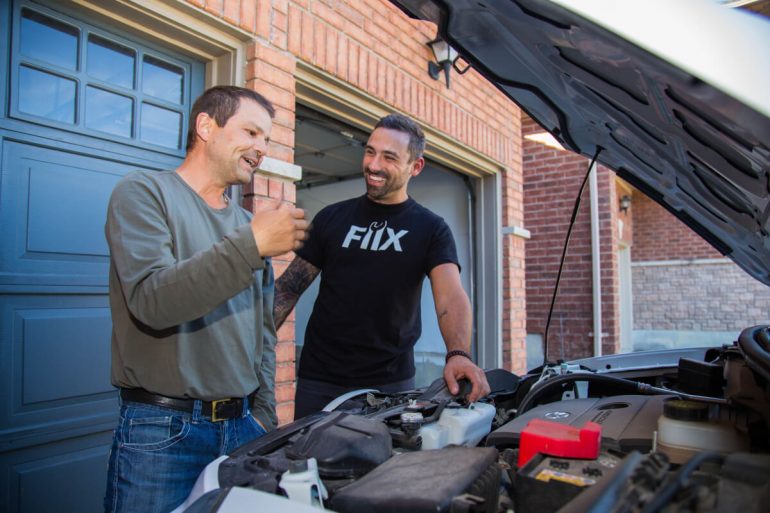As part of a regular series powered by Dell Small Business, BetaKit asks entrepreneurs to share lessons learned as they’ve grown their small business.
Toronto-based startup Fiix believes that getting your car fixed should be easier. Understanding it’s not easy for drivers to get their car to an auto shop, Fiix sends mechanics for all makes and models directly to their customers.
BetaKit spoke with Fiix co-founder and CTO Khallil Mangalji about where he thinks the future of the auto repair industry is heading, and why it’s important to give customers a better alternative to the typical auto mechanic garages.
What were some of the biggest struggles you had getting Fiix off the ground in the early days?
We started by sending mechanics to people’s homes to change their tires at their house for $40. There was a lot of organic traffic initially, but when it became time to grow, we realized that you have to spend money to get customers. I think a lot of businesses learn this early on, but when they do their pricing, they realize that it also costs money to acquire the customer in the first place.
“We had to make sure we had a strong focus on our unit economics.”
There’s a stat that almost 40 percent of all venture capital money ends up going to Facebook and Google to acquire customers. For us to create a business, we had to make sure we had a strong focus on our unit economics, which meant we had to determine all the costs involved in servicing a customer, not just the cost of sending a mechanic to them and the mechanic’s salary.
You first have to convince the customer to use you, which might require a lot of advertising and promotions. Then you have to send the mechanic to do the work; then there’s customer service costs after the work has been done, because you have to have people available for customers to call; and then there’s follow-up costs in case something goes wrong.
That lesson of unit economics helped us realize how to properly price our product so that we could grow into a profitable business, and not just a business that burns venture capital money to get customers and then fizzles out. Now we’re self-sustaining because we have a strong focus on making sure our economics are always profitable.
RELATED: Fiix launches in Toronto to help you trust your mechanic again
How did you go about identifying the problems that Fiix solves, and how did you validate that your solution was viable?
What’s nice about our product is that it’s a very direct solution. With auto repair, people know that their car is broken and they need to get it fixed. And for them to get it fixed, it can be tricky, because they might have to spend hours to drive to the repair shop; sometimes they have to take two people so there’s someone to drive them home after; and they worry the mechanic’s going to scam them, because mechanics tend to upsell you on all these things you don’t need.
Our solution was very direct: we know people hate going to the mechanic, so let’s make it better. Let them come to you and fix your car for you at home. No one’s ever productized that.

How does Fiix define its culture and what does it do to foster that culture?
What’s nice about Fiix is that our culture’s very warm and very diverse, and it’s because we have a whole bunch of teams made up of people from all different backgrounds. And like any other startup, Fiix has flexible vacation policies and video games and fun people to work with, plus autonomy – people can choose what they want to work on.
I think what makes us different is that there’s a lot of freedom. A lot of companies will say that you won’t be managed that much, yet at the end of the day there’s still a lot of management. But if you can make it so people are almost self-managed, and you don’t incentivize anyone to manage, then people end up feeling a lot freer. At Fiix, we really like to let people rule their own work day – they can work at home if they want or they can work at the office, it’s very relaxed that way.
Is there any advice you’d want to give to your past self?
One thing I always say is that the freedom to work on what you want is a bit of a luxury. For most people in general, the ability to wake up and work on whatever they want to isn’t a reality. They have to take a paying job instead. I really feel like if I’m in a place where I’m able to do what I want, then I have to remember that’s a luxury. If I have that ability, then I should spend my free time doing things I want to do that also end up being impactful.
What does Fiix plan on doing next to keep innovating?
The cool thing about our business is that although auto repair sounds like a bit of an older industry, with us, our mechanics are coming to you, which is where the innovation is. If you look at the space overall, Tesla has the Tesla Ranger, where they send a Tesla mechanic to your house to fix your Tesla. And now we see all these other OEMs (Original equipment manufacturers) trying to do the same thing. I think in the next ten years, you’ll see BMW and Mercedes and all these [OEMs] send their mechanics to you.
Then you’ll start seeing cars that aren’t owned by people – they’re owned by a central fleet. In that case, the thing that matters most for auto repair isn’t price – it’s not about having the cheapest or most convenient repair. All that matters is whichever company can have their cars on the road for the longest amount of time ends up winning.
So, Fiix is super focused on ensuring that companies with a centralized set of cars around a city can have constant uptime. That means we’ll send a mechanic anywhere in the city to fix a broken-down car, do an oil change, do a battery change, and so on. We found in our studies that in places where it would take over 40 hours to get a car back up and running, we can get it back up in 4-6 hours. For businesses and for the future of autonomous cars owned by companies, Fiix is going to be a perfect fit.


